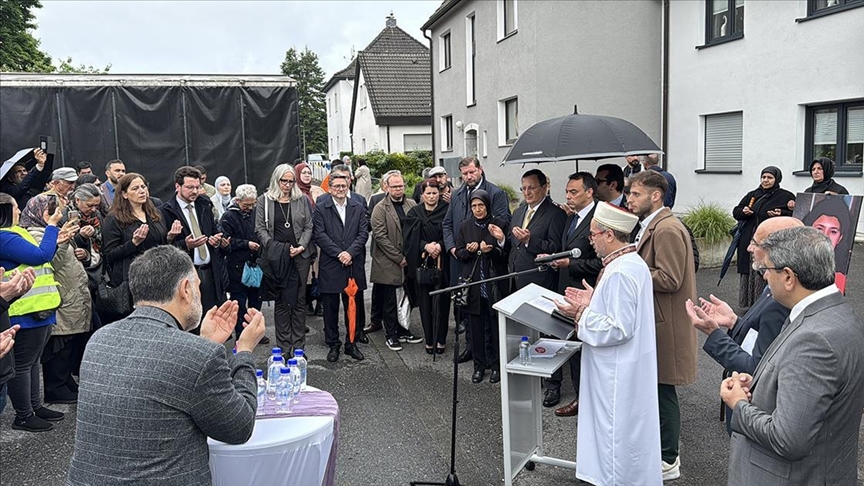OPINION - After Solingen: What lessons to learn from far-right violence?
While Germany was not home to a far-right political party for several decades following the end of World War II, the recent rise of the Alternative for Germany (AfD) gave racist talking points a much larger podium

- Rather than outlawing the AfD, a more democratic response would address the root causes of its rise: the failure of political elites to genuinely represent all citizens, combat poverty, and social exclusion
- The author is a Senior Research Fellow at The Bridge Initiative and Assistant Teaching Professor of International Relations at the College of William and Mary.
ISTANBUL
On May 29, 1993, five young girls and women of Turkish origin were killed in the western German city of Solingen, near Cologne, by neo-Nazis. Far-right extremists set the Genc family's house on fire. Their "crime" was to be of Turkish origin. Similar large-scale assaults on refugee homes happened in other German cities such as Hoyerswerda, Rostock-Lichtenhagen, and Molln.
While their relatives try to preserve their memory and are involved in fighting racism, German politicians have been pilgrimaging to the site of the Solingen attack ever since, for more than 30 years. But already back then, the German Bundestag (parliament) became a place of fierce debate about restricting the right to asylum and an increasing anti-immigration sentiment.
While Germany was not home to a far-right political party for several decades following the end of World War II, the recent rise of the Alternative for Germany (AfD) gave racist talking points a much larger podium. In the last elections, they almost doubled their electoral gains and rose to become the second-largest political party in the German Bundestag, falling only slightly behind the main governing conservative party.
Violence towards immigrants
But the hypothesis that neo-Nazis in parliament would diminish their presence in the underground did not manifest. According to the latest annual report issued by Germany’s domestic secret service in 2024, the Office for the Protection of the Constitution (BfV), the number of far-right extremists was around 40,600, up nearly 2,000 from 2022, with more than one-third seen as prepared to use violence. Some 1,270 acts of right-wing extremist violence were recorded, and racist offenses saw an overall increase to 10,400 during the same period, a 39% rise.
The wave of far-right violence on asylum houses in the 1990s was no stand-alone event. One remembers the infamous National Socialist Underground (NSU) murders, where a series of racist murders by the NSU between 2000 and 2007 killed 10 people, targeting primarily people of Turkish origin. In 2020, another racially motivated violent attack in Hanau killed nine people. In the last 10 years, more than 100 attacks on mosques have been registered annually.
But the violence did not stop at the doorstep of racially marginalized people. In 2019, the murder of a conservative pro-immigration regional governor named Walter Lubcke shook the German public. While the German public treated it as a lone-wolf attack, the Ministry of Interior had already revealed to the Leftist opposition party in 2018 that their secret service had collected more than 25,000 names that were put on so-called death lists by far-right groups operating in the underground.
Many of these groups are not solely about killing people randomly, but for a reason. Revelations about a transnational network headquartered in Germany named Hannibal that was founded in 2015 to recruit former security service agents, soldiers, and policemen, along with right-wing individuals, to prepare them for a “Day X,” i.e., a military coup d’etat.
These groups and the violent activities against marginalized groups and minorities, from Jews and Muslims to immigrants in general, did not emerge out of the blue. They have to be seen as linked to the demise of trust for the state institutions and the increasing support of far-right-leaning movements and parties.
The German state has put the AfD, which currently even tops some polls, under the surveillance of the BfV, arguing that it regards it as extremist. Will this change anything? While some might feel less confident in expressing their allegiance, support, or membership in public, it is hard to believe that ostracization will lead to a softening or marginalization of the AfD. Rather, this latest move might only feed the narrative of the state being an enemy of the people and serving the special interests of the wealthy and powerful liberal elites.
Rather than outlawing the AfD, a more democratic response would address the root causes of its rise: the failure of political elites to genuinely represent all citizens, combat poverty and social exclusion, listen to marginalized groups—including the working poor and racial minorities—and articulate a vision for a fairer future in Germany.
*Opinions expressed in this article are the author's own and do not necessarily reflect Anadolu's editorial policy.
Anadolu Agency website contains only a portion of the news stories offered to subscribers in the AA News Broadcasting System (HAS), and in summarized form. Please contact us for subscription options.


